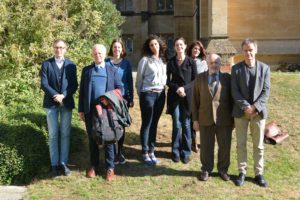
On 9 October, the Nomadic Empires project team hosted a workshop with Anatoly M. Khazanov, Ernest Gellner Emeritus Professor of Anthropology at the University of Wisconsin–Madison and Distinguished Visiting Professor of the Hebrew University in Jerusalem, Fellow of the British Academy, and Corresponding Member of the UNESCO International Institute for the Study of Nomadic Civilization. The workshop was dedicated to the topic of the Steppe Nomads in the Eurasian Trade. Professor Khazanov and the workshop participants discussed different types of trade that the nomads were engaged in, such as regional, interregional, transit, and long-distance trade; and they also talked about how successful nomadic polities created a demand for trade in luxuries, provided supplies for that exchange, and safeguarded the movement of goods across different land routes. Khazanov explained that during some historical periods, other routes were more important than the transcontinental “Silk Route”—namely North-South routes, riverine and maritime routes, and also regional and local down-the-line exchange in goods. He stressed that localized mechanisms of connectivity between different communities were more important and responsible for the transfer of goods, ideas, and people across continents than the process of “globalization” during the pre-modern time period. Hence, Khazanov addressed a modern trend to exaggerate the role of the Silk Road in Eurasian history due to various political and nationalist agendas. The workshop dialog included the topics of the politics of nomadic trade, as well as the Eurasian transfer of technologies of trade and its mediators during the nomadic political domination of the Steppe, such as during the Mongol Peace.